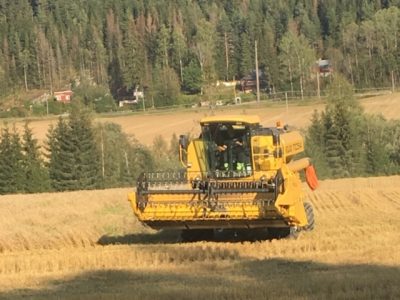Norwegian farmers’ two major lobbying organizations have handed over demands for NOK 2.1 billion in taxpayer support for the year ahead, spread over cost coverage, higher prices for their products and direct subsidy from the state budget. It would amount to income growth of nearly NOK 50,000 a year, more than triple what most other workers are getting.

Lars Petter Bartnes, leader of Norges Bondelag (Bondelaget), and Kjersti Hoff, representing smaller farmers in the Norsk Bonde- og Småbrukarlag, insist their demands are neither audacious nor extreme. They claim Norwegian farmers’ income has lagged that of others in Norway for years and they need to narrow the gap. They also claim that because farmers often work day and night tending to their livestock or crops, their average hourly pay is way below the standard minimum of NOK 160 an hour.
“We need a strong increase in income in order to give our farmers faith in the future,” Bartnes claimed as he and Hoff delivered their demands to the Agriculture Ministry this week. They called it “destiny hour” for both the farmers and food production in high-cost Norway.
“Many farmers are in a tough economic situation, many are standing at a crossroads,” Bartnes said, adding that “we’re getting more and more clear messages that farmers won’t recommend the work to their children.”

Both farming organizations have also been getting lots of messages lately that farmers aren’t so satisfied with them either. Bondelaget and the small farmers’ group are under pressure from a grassroots movement called Bondeopprør21, literally an uproar bordering on a revolt by members who aren’t satisfied with what the organizations have achieved in direct negotiations with the state in recent years. They want to be able to vote on any proposed settlement, to either approve or reject it. A threat of civil disobedience or strikes lurks in the background.
Newspaper Klassekampen has reported that both organizations rejected such a vote, leading to more unrest among the farmers and roughly 20,000 supporters who’ve signed social media petitions on their behalf. There’s lots of concern that small farms especially continue to disappear in Norway, and that Norway’s degree of self-sufficiency will suffer.
One major negotiating problem for the farmers, however, is that they actually had a very good year in 2020, with dairy income so high that the farmers’ market regulator and major cooperative Tine paid out bonuses to everyone on staff. While other workers have been laid off during the Corona crisis, and many sectors are struggling, sales of domestic agricultural products have soared. Norwegian consumer have mostly been stuck at home and forced to make their own meals, leading to spikes in sales of milk, cheese, bread, vegetables and meat. With borders closed Norwegians also haven’t been able to drive over to Sweden to shop in grocery stores where prices are much lower than in Norway. The farmers did well, also in keeping up with demand for locally produced food. Self-sufficiency did not appear to be a problem.
Bartnes and other farming advocates downplay the sharp increase in their income in 2020, preferring to dwell on earlier years and not least when they needed state bailouts because of the drought in 2018. “A positive result from a strange year doesn’t reduce the seriousness of the economic situation in agriculture,” Bartnes insisted. With borders still closed and a trip to the grocery store still a highlight of the day, this year’s farming revenues have been looking good, too. State broadcaster NRK recently reported that larger-scale farmers in Norway reported average incomes over NOK 700,000 a year. Many also maintain jobs on the side of their farming work.
Now it’s up to the state to respond to the farmers’ demands, with that expected in early May and a settlement deadline a few weeks after that. The state is under pressure to allow more imported food products into Norway, especially British cheese and other dairy products in negotiations for a new post-Brexit trade deal with the UK. Norwegian farmers want to maintain high tariffs and suppress foreign competition.
The state also notes that most all other groups are having to accept moderate pay raises this year that don’t keep up with the cost of living. It would also be politically difficult to grant the farmers’ a big hike in economic support that would be higher than nurses and teachers can expect.
Immediate political reaction to the farmers’ lofty demands was divided along party lines. The farmer-friendly Center Party claimed the demands were in keeping with the Parliament’s intentions.
“We need to give a proper lift to farmers’ income if we’re going to continue to have food production nationwide,” Geir Pollestad of the Center Party told news service NTB. “We expect the government to stretch itself in meeting the farmers’ demands this spring.”
Sivert Bjørnstad of the Progress Party was more concerned with the need for moderation in pay demands. “I don’t think it would be very harmonious if the farmers get NOK 48,000 more a year, which would be a lot more than the teachers, nurses, nursing assistants and cleaning personnel can get” Bjørnstad told NTB. “They’re the groups that have been on the front line during the pandemic and deserve the biggest income growth.”
newsinenglish.no/Nina Berglund

